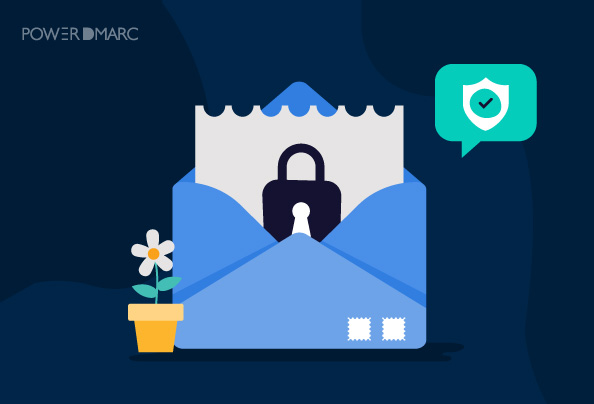Is DMARC Required?
If you run an organization that makes use of a substantial amount of email flow on a daily basis, chances are you have already come across the term “DMARC”. So what is DMARC? Domain-Based Message Authentication, Reporting and Conformance is your email checkpoint on your receiver’s side that helps you authenticate your outbound emails as well as respond to situations where these emails have questionable legitimacy. DMARC offers several advantages and it is especially useful in today’s world where remote-working environments are being adopted and electronic communication has become the most commonly used method of interaction for businesses. Let’s list down the 5 important reasons why is DMARC required in the context of today:
1) DMARC Helps Mitigate Impersonation Attacks
Ever since the news of the COVID-19 vaccine broke out worldwide in February 2021, cyber attackers took advantage of the situation to create forged emails using authentic company domains, offering vaccine lures to employees and customers. Several users, especially aged citizens fell victim to the lures and ended up losing money. This explains why is DMARC required now more than ever.
A new form of BEC (Business Email Compromise) has recently taken the internet by storm, exploiting loopholes in Microsoft 365’s read receipts and manipulating authentication protocols to evade spam filters and security gateways. Sophisticated social engineering attacks like these can easily bypass robust security measures and trick unsuspecting customers into submitting their credentials.
DMARC minimizes the chances of BEC and domain spoofing attacks and helps secure your emails from fraud and impersonation. This is because DMARC works differently than your ordinary integrated security gateways that come with your cloud-based email exchange services, offering a way for domain owners to decide how they want receiving servers to respond to emails failing SPF/DKIM email authentication protocols.
2) DMARC Improves Email Deliverability
When your email domain gets spoofed, your receivers who have been interacting with your brand for years are the last people to be suspicious of fraudulent activities from your side. Hence, they readily open the spoofed emails and fall prey to these attacks. However, the next time they receive an email from you, even if the message is authentic and from an authorized source they would be reluctant to open your email. This will drastically impact your email deliverability, as well as your company’s email marketing strategies and agendas.
However, DMARC can improve email deliverability by almost 10% over time! DMARC is required for you to remain in complete control of your domain by choosing which messages get delivered to your recipients’ inboxes. This keeps illegitimate emails at bay and makes sure legitimate emails always get delivered without delay.
3) DMARC Aggregate Reports Help You Gain Visibility
DMARC Aggregate reports can help you view your authentication results and mitigate errors in email delivery at a faster pace. It helps you gain insight on sending sources and IP addresses that are sending emails on behalf of your domain and failing authentication. This helps you track down malicious IP addresses as well, explaining why is DMARC required.
PowerDMARC’s DMARC aggregate reports are available in 7 distinctive views on the platform that helps you gain an unfiltered perspective on your email sending sources and hostnames, like never before! Additionally, we provide you with the option to instantly convert your DMARC reports into PDF documents that you can share with your whole team, as well as create a schedule for them to be emailed to you at regular intervals.
4) DMARC Forensic Reports Help You Respond to Forensic Incidents
DMARC forensic reports are generated whenever a forensic incident is triggered, such as when the outbound email fails SPF or DKIM authentication. Such an incident may be triggered in case of domain spoofing attacks when an email domain is forged by an impersonator using a malicious IP address to send a fraudulent message to an unsuspecting receiver that appears to be coming from an authentic source they know and can trust. Forensic reports provide in-detail analysis of malicious sources that may have attempted to spoof you, so that you can take action against them and prevent future incidents.
Note that forensic reports are highly detailed and may contain your mail body. However, you can avoid disclosing your email contents while viewing your DMARC forensic reports by encrypting your reports with a private key that only you have access to, with PowerDMARC.
5) DMARC Helps Improve Your Domain Reputation
A good domain reputation is like a feather in your cap, as the domain owner. A good domain reputation indicates to receiving email servers that your emails are legitimate and from reliable sources and hence are less likely to be marked as spam or land up in the junk folder. DMARC helps you improve your domain reputation by validating your message sources and indicates that your domain has extended support towards secure protocols by implementing standard email authentication practices like SPF and DKIM.
With this, it is evident why is DMARC required, and can prove to be beneficial for your business! So the next step is :
How to Configure DMARC for Your Domain?
PowerDMARC’s DMARC Analyzer can help you implement DMARC in 4 easy steps:
- Publish your SPF, DKIM and DMARC record in your domain’s DNS
- Sign up with PowerDMARC to gain access to your DMARC aggregate and forensic reports and monitor your email flow
- Shift from a policy of monitoring to DMARC enforcement, to gain maximum protection against BEC and spoofing
- Stay under the SPF 10 lookup limit with PowerSPF
Sign up today for your free DMARC Analyzer and avail of the multiple benefits of DMARC today!
